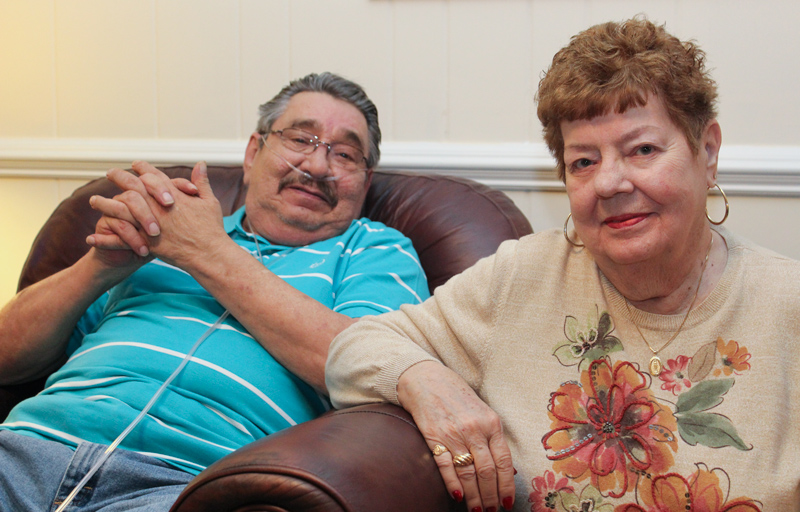
AIKEN—Marge Glauser plans her days around the needs of another person — her best friend Gary Gilbault.
He suffers from congestive heart failure and chronic obstructive pulmonary disease and must be hooked up to oxygen almost constantly. Glauser helps him with everything from trips to the doctor to basic daily needs.
It isn’t an easy role but she does it gladly, along with thousands of others who work behind the scenes each day caring for spouses, parents, children, relatives and friends.
Glauser is a caregiver.
“Your time is not your own when you do this, and there’s a lot of work involved, but it’s what you do when you’re devoted to a person,” she said.
She recently received a “Portrait in Care” award from the AARP that included a reception at St. Gerard Church in Aiken, where she and Gilbault are members, plus a visit from a state legislator.
Glauser had shared her story with the organization and was thrilled to the point of tears when she received the news, she said. However, she isn’t seeking recognition for herself. She wants more people to know about the work caregivers do, and hopes her story will motivate others to reach out and advocate for more programs for them, like respite care.
Those programs will become increasingly necessary as time goes on because more and more people find themselves in that situation.
According to a 2015 AARP report, “Caregiving in the U.S.”, an estimated 43.5 million adults have provided unpaid care to an adult or child in the past 12 months. As the population ages and diseases such as Alzheimer’s and dementia increase, those numbers will continue to rise.
Becoming a caregiver is sometimes forced upon people because there are no other alternatives, but just as often — as in Glauser’s situation — it is an undertaking of love and a conscious choice to help maintain the health and dignity of a loved one.
No matter the circumstances, caregivers carry on the Church’s teaching about the sanctity and dignity of all life.
Kathy Schmugge, director of the Office of Family Life for the diocese, said caregiving is particularly important today because elderly, disabled or ill people are looked upon as a burden, all too often.
“There are seasons to life but they are not meant to be times to disconnect or not care,” Schmugge said. “The relationships change. Sometimes you are the one being assisted, as when your parents help you in childhood, and then you are called in turn to assist them or someone else when they are older. The key is to always remain connected, to remember the sanctity of life, and to learn to readjust and be a gift to others.”
She said the way to maintain a healthy and loving attitude in a caregiver situation is to remember that “situations can be burdensome, but people are never a burden.”
Glauser reflected that caregiving requires a person to structure their schedule around their loved one. She advises caregivers to look after themselves and realize they need to maintain personal interests and enjoyments when possible. Her one indulgence, she noted, is visiting a nail salon for manicures — the latest was a brilliant red with accents of glitter.
Friends can also be indispensable help. Glauser said parishioners at St. Gerard have become like family to her and provide needed support.
She encouraged people who know caregivers to pitch in with duties such as household chores or shop-ping. Glauser said it would be a huge help if more churches and organizations created respite care programs. Even an hour or two of relaxation and some time for themselves can help a person recharge.
Beverly Black Belser of Columbia knows firsthand the benefits of respite care programs because she frequently took her mother Lillian to one at St. Joseph Church.
Before her mother’s death at age 93, Belser lived with and cared for her for about eight years. She drove her to doctor’s appointments and helped with chores and other needs.
She found that caring for a loved one involves maintaining an attitude of consideration and patience.
“Don’t get upset if you have to do something over again or if you have to explain something to the person over and over again,” she said. “Try not to let yourself get impatient. I think of how my mom took care of me all those years I was a child, and I was lucky God chose for me to be in the position to care for her. We’re lucky if we get that chance.”
Belser also had advice for what to say on the rare occasions a caregiver leaves the house for a personal errand or appointment.
“Always say ‘I love you,’” she said, “I would always tell that to my mom before I went out. It’s so important to the elderly or the ill to hear that, because in all of this, love is the most important thing.”

